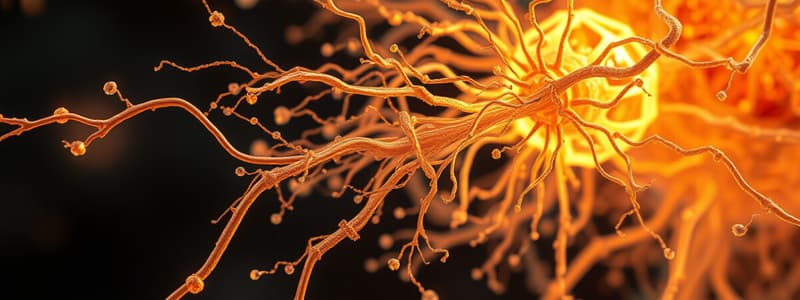Podcast
Questions and Answers
What is the primary structural component of microfilaments?
What is the primary structural component of microfilaments?
- Collagen
- Tubulin
- Actin (correct)
- Keratins
Which statement correctly describes the role of the cytoskeleton in cell division?
Which statement correctly describes the role of the cytoskeleton in cell division?
- It segregates chromosomes during cell division. (correct)
- It generates ATP during mitosis.
- It envelops the nucleus during cell division.
- It synthesizes ribosomes for protein production.
Which type of cytoskeletal element is primarily involved in the formation of cilia and flagella?
Which type of cytoskeletal element is primarily involved in the formation of cilia and flagella?
- Microfilaments
- Collagen fibers
- Microtubules (correct)
- Intermediate filaments
What triggers the polymerization process of actin monomers into filaments?
What triggers the polymerization process of actin monomers into filaments?
Which type of process is endocytosis most associated with?
Which type of process is endocytosis most associated with?
What are the two types of tubulin that microtubules are made of?
What are the two types of tubulin that microtubules are made of?
Which function is NOT associated with actin filaments?
Which function is NOT associated with actin filaments?
What is the significance of the double helix structure of actin filaments?
What is the significance of the double helix structure of actin filaments?
How do intermediate filaments differ from microfilaments and microtubules?
How do intermediate filaments differ from microfilaments and microtubules?
Which mechanism do actin filaments rely on during cytokinesis to separate cells?
Which mechanism do actin filaments rely on during cytokinesis to separate cells?
Flashcards are hidden until you start studying
Study Notes
Microfilaments and Cytoskeleton Overview
- Microfilaments, also known as actin filaments, are crucial components of the cytoskeleton in cells.
- The cytoskeleton consists of a network of fibrous proteins, including microfilaments and microtubules, providing structural support.
Key Characteristics of the Cytoskeleton
- Composed of proteins, primarily structural proteins essential for cell shape and movement.
- Synthesized in ribosomes and organized into filaments or tubules through polymerization from monomers to polymers.
- Plays a vital role in cell division, intracellular transport, and shape maintenance.
Functions of the Cytoskeleton
- Provides structural integrity and shape to the cell.
- Aids in muscle contraction and cytokinesis (cell separation).
- Facilitates cell signaling and organelle movement.
- Segregates chromosomes during cell division and assists in constructing cell membranes.
Types of Cytoskeletal Components
- Three main types: microfilaments (actin), microtubules (tubulin), and intermediate filaments (varying by tissue).
- Microfilaments are predominantly made of actin, while microtubules are composed of alpha and beta tubulin.
Structure of Actin Filaments
- Actin filaments form from the polymerization of G-actin monomers, resulting in a double helical structure.
- ATP (adenosine triphosphate) is necessary for actin filament functions, providing energy for movement.
Functions of Actin Filaments
- Serve as tracks for intracellular transport and movement.
- Contribute to muscle contraction and cytokinesis.
- Involved in endocytosis, including:
- Pinocytosis: ingestion of small particles.
- Phagocytosis: ingestion of larger particles.
- Help form cleavage furrows during cell division, where actin-myosin rings create indentations for cellular separation.
Studying That Suits You
Use AI to generate personalized quizzes and flashcards to suit your learning preferences.



